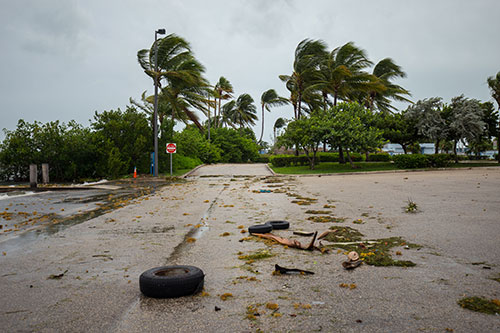
Cleaning Up After Hurricane Irma
To Our Policyholders,
As Florida and the surrounding states continue to recover from Hurricane Irma, we want you to know EMPLOYERS® is here to help. We realize that in an unprecedented situation like this, it may require all-hands-on-deck from you and your employees to help with clean up and rebuilding efforts. While it may be necessary for your employees to pitch in and get your business operational again – regardless of whether they are helping while on the clock or after hours – there are certain precautions you should take to prevent them from getting injured or sick.
If your business sustained extensive damage, the cleanup is usually best left to trained professionals who will make sure the work is completed safely and meets required building codes. If any of the following damage is present in your building, do not attempt cleanup without first consulting an expert.
- Contaminated Floodwaters. The floodwaters left in the aftermath of Hurricane Irma are contaminated with sewage and have unusually high amounts of coliform and E. Coli, which can cause respiratory issues, intestinal problems and infections.
- Downed Power Lines. Assume all power lines are live, and make sure to stay at least 10 feet away from them. Only trained utility workers or electricians should repair damaged power sources.
- Debris Removal. Water-soaked, contaminated materials should only be removed by trained workers with proper personal protective equipment such as a hard hat, a hazmat suit, steel-toed boots and eye and face protection.
Even if the damage your business sustained is less-extensive, there are still precautions you and your employees should take. The Occupational Safety and Health Administration (OSHA) has a helpful fact sheet that details potential hazards and preventive measures that can help keep your employees safe during disaster clean up and recovery. Some of the tips they recommend include:
- Provide appropriate personal protective equipment
- Prevent people from performing tasks they do not have the training, experience or physical ability to handle
- Be particularly mindful of wet, slippery, uneven or elevated surfaces that could lead to an employee getting hurt from a slip, trip or fall – the most common causes of employee injuries
- Be careful using portable generators – and always make sure they are properly ventilated – to prevent electrical fires, shocks or electrocutions, or harm from toxic carbon monoxide exposure
In addition to OSHA resources, the Florida Department of Financial Services also provides helpful resource page and additional information.
For guidance on workers’ compensation claims related to Hurricane Irma, contact your agent or EMPLOYERS today.
